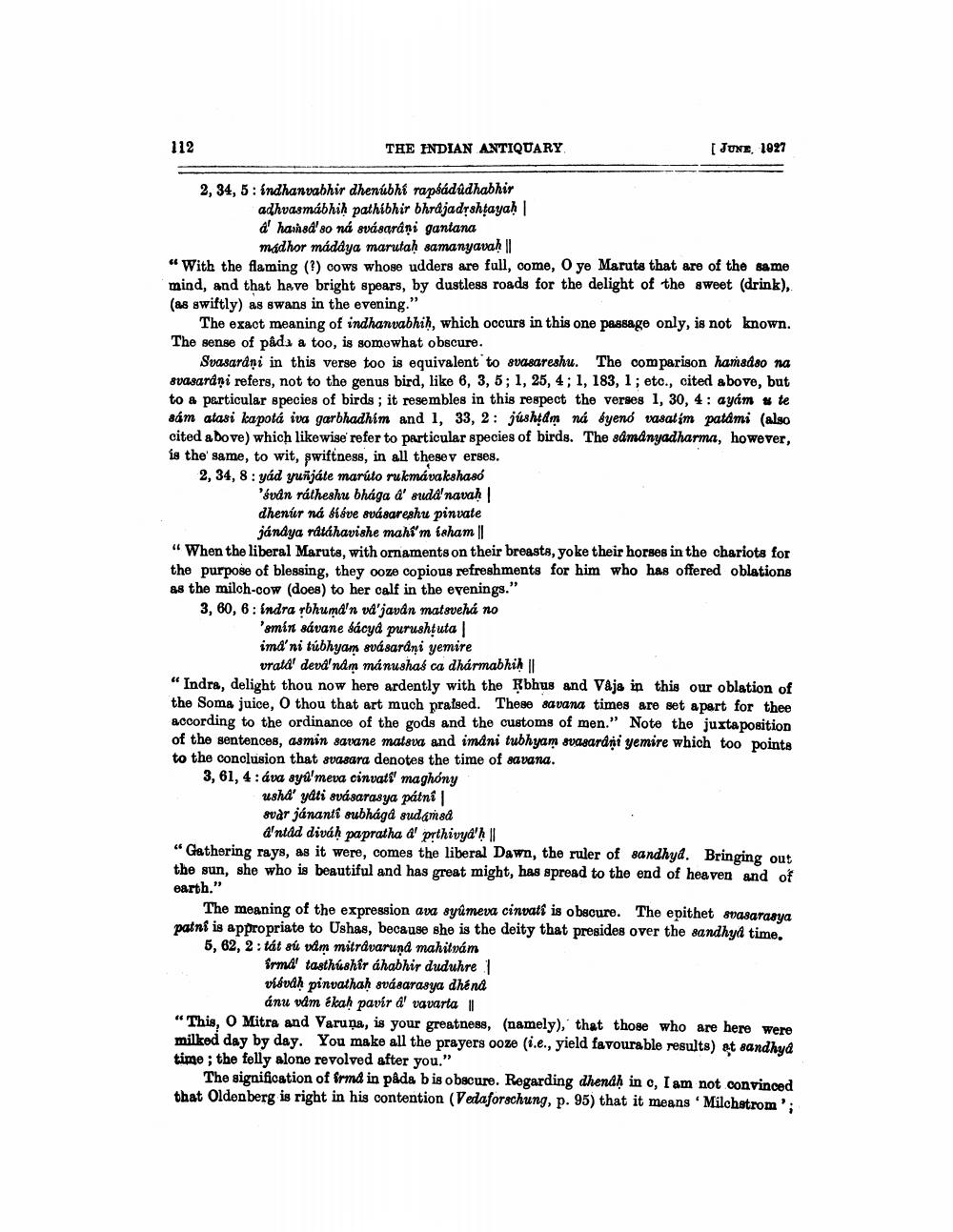________________
112
THE INDIAN ANTIQUARY
[ JUNE, 1027
2, 34, 5 : indhanvabhir dhenúbhi rapsádudhabhir
adhvasmábhih pathibhir bhrdjadrshtayah ! d' hansd' so na svásarani gantana
madhor mádaya marutah samanyavah || “With the flaming (9) cows whose udders are full, come, Oye Maruts that are of the same mind, and that have bright spears, by dustless roads for the delight of the sweet (drink), (as swiftly) as swans in the evening."
The exact meaning of indhanvabhih, which occurs in this one passage only, is not known. The sense of pâda a too, is somewhat obscure.
Svasarani in this verse too is equivalent to svasareshu. The comparison hamadso na svasardni refers, not to the genus bird, like 6, 3,5; 1, 25, 4;1, 183, 1; etc., cited above, but to a particular species of birds; it resembles in this respect the verses 1, 30, 4: ayam # te sám atasi ka potá iva garbhadhim and I, 33, 2: júshtam ná byenó vasalim patami (also cited above) which likewise' refer to particular species of birds. The sámányadharma, however, is the same, to wit, swiftness, in all these v erges. 2, 34, 8:yád yuñjáte marúto rukmávakshasó
'éván rátheshu bhága a' suda navah dhenur ná diéve svásareshu pinvate
jándya rdtáhavishe mahi'm ísham || “When the liberal Marute, with ornaments on their breasts, yoke their horses in the chariots for the purpose of blessing, they ooze copious refreshments for him who has offered oblations as the milch-cow (does) to her calf in the evenings." 3, 60, 6: indra rbhumd'n ud"javan matsvená no
'smin savane sácyd purushtuta imd'ni túbhyam svásardni yemire
vratal devándm mánushaś ca dhármabhih | “ Indra, delight thou now here ardently with the Kbhus and Vaja in this our oblation of the Soma juice, O thou that art much pralsed. These savana times are set apart for thee according to the ordinance of the gods and the customs of men." Note the juxta position of the sentences, asmin savane mateva and imani tubhyam svasarini yemire which too points to the conclusion that svasara denotes the time of savana. 3, 61, 4:áva syu'meva cinvats' maghóny
ushd' yati svásarasya pátní svár jánanti subhága sudamed
d'ntad divák papratha a' prthivyd'h | "Gathering rays, as it were, comes the liberal Dawn, the ruler of sandhyd. Bringing out the sun, she who is beautiful and has great might, has spread to the end of heaven and of earth."
The meaning of the expression ava syûmeva cinvatí is obscure. The epithet sasarasya patni is appropriate to Ushas, because she is the deity that presides over the sandhyd time, 5, 62, 2: tát sú vdm mitrdvarund mahitvám
irmd' tasthúshir áhabhir duduhre 1 visvdh pinvathah svásarasya dhand
ánu vám ékah pavir d' vavarta | “This, O Mitra and Varuņa, is your greatness, (namely), that those who are here were milked day by day. You make all the prayers ooze (i.e., yield favourable results) at sandhya time; the felly alone revolved after you."
The signification of frmd in pada bis obscure. Regarding dhendḥ in , I am not convinced that Oldenberg is right in his contention (Vedaforschung, p. 95) that it means 'Milchstrom';




